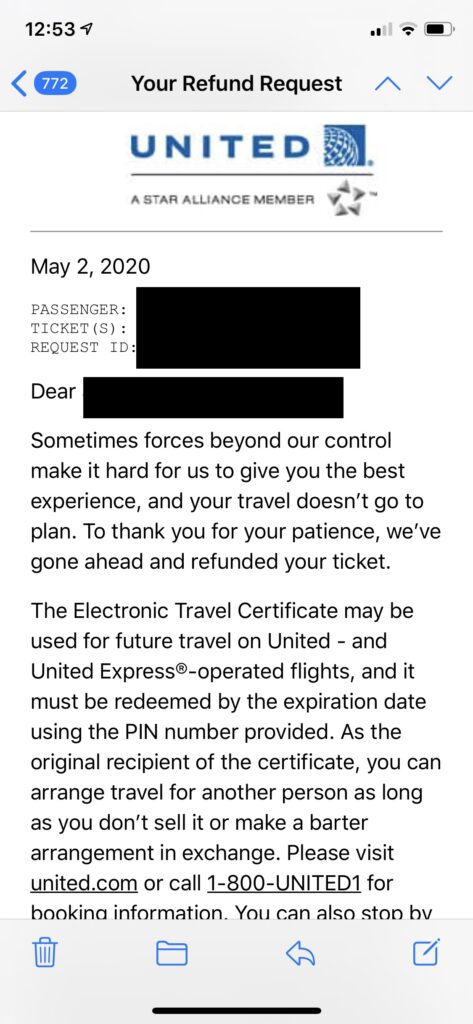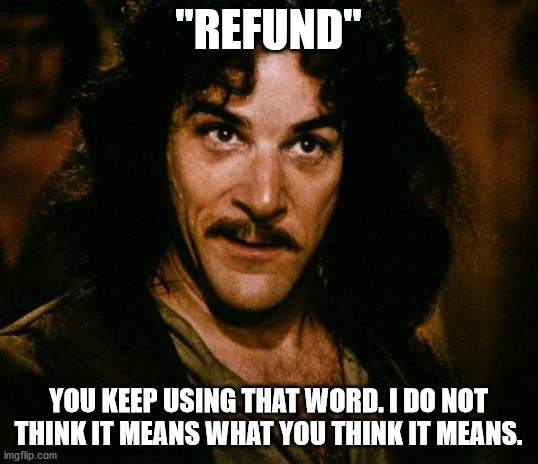You may remember that I posted about United’s refusal to refund tickets for cancelled flights, instead offering passengers ETCs (electronic travel certificates) for future bookings. During the crazy times we are living, United is trying to preserve as much cash as possible. Their recent earnings call statedearnings call stated a first quarter net loss of $639 million or $7.1 million/day. But, United is still partaking in rather peculiar and misleading behavior. Recently, the airline has skirted Department of Transportation rules for refunds by claiming only cancellations where the customer could not be re-accommodated on another flight within 6 hours of the original were due a refund. The DOT website states the following:
In the following situations, passengers are entitled to a refund of the ticket price and/or associated fees.
Cancelled Flight – A passenger is entitled to a refund if the airline cancelled a flight, regardless of the reason, and the passenger chooses not to travel.
Schedule Change/Significant Delay – A passenger is entitled to a refund if the airline made a significant schedule change and/or significantly delays a flight and the passenger chooses not to travel.
That seems pretty straightforward. If your flight gets cancelled, you get a refund. Full stop. Back to my recent experience, United refused to give a refund for multiple flight cancellations on the same itinerary and the only alternative was to spend the night at O’Hare on my way to Montreal. As a result, I filed a DOT complaint, explaining the situation and giving screenshots of the flight cancellations. A few days later I received a reply from a United representative that my complaint was received and that a refund was being processed. Fast forward 17 business days which is the average refund time with United lately and I received the following in my inbox:
Did you catch that? Here it is as plain text (emphasis mine)
Sometimes forces beyond our control make it hard for us to give you the best experience, and your travel doesn’t go to plan. To thank you for your patience, we’ve gone ahead and refunded your ticket.
The Electronic Travel Certificate may be used for future travel on United – and United Express®-operated flights, and it must be redeemed by the expiration date using the PIN number provided.
I’ve always thought of a refund as a return of my payment back to me. If I pay with cash, the vendor gives me cash back (or a debit card that I can use anywhere). If I pay with a credit card the vendor returns the payment back to the credit card. Apparently, United thinks “refund” means “Electronic Travel Certificate”. Again, they are likely trying to preserve cash but this is not just disingenuous, it’s lying. This is not a refund, it is a credit that you have to use with United. You can’t use that money for something else, like food. All I can think of is a family planning on a taking a vacation when all of the Covid-19 shutdowns begin. Their flights cancel and they call United and are told that they’ll get a refund, then they receive an e-mail like what I got and now they believe they’re out that cash. It is not right that United is playing with words to try and keep as much cash as they can as the airline industry suffers.
All I can think of is Inigo Montoya in The Princess Bride. United keeps using “refund” in their language but I do not think it means what they think it means.
My advice to you, the traveler, is to be persistent. I followed up with United after receiving this email and after a lengthy back and forth, I clearly explained that I did not cancel the flights voluntarily and that the offered alternative flights were not acceptable. I have since been told that I will receive a refund to my original form of payment in 21 business days… It seems United has a single intern processing all refunds.


